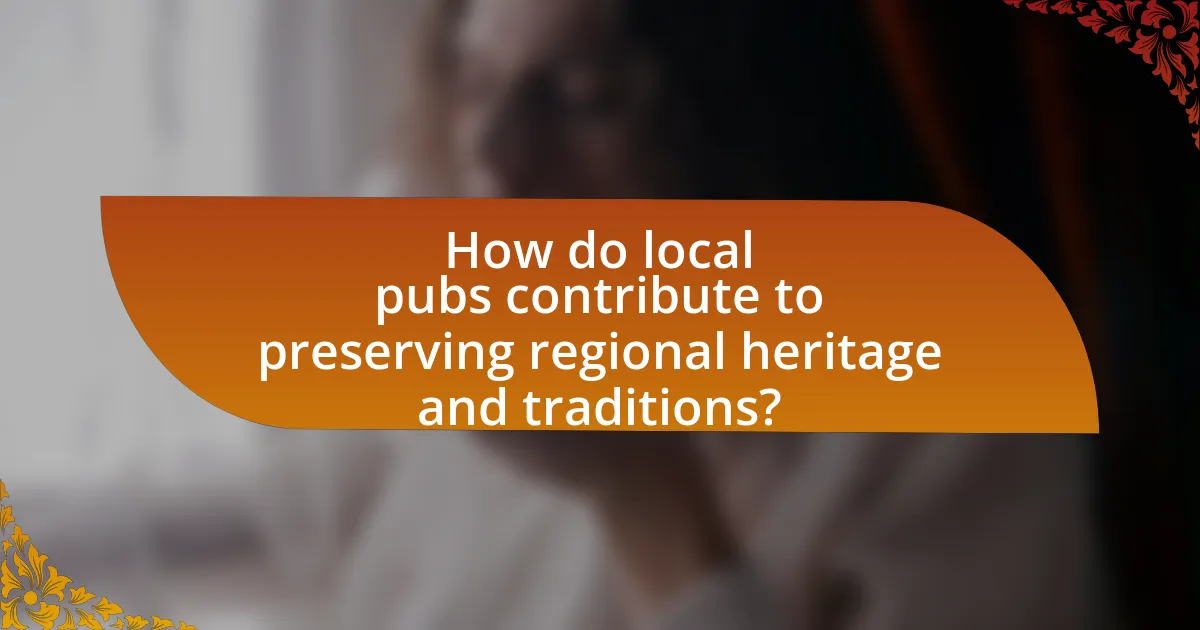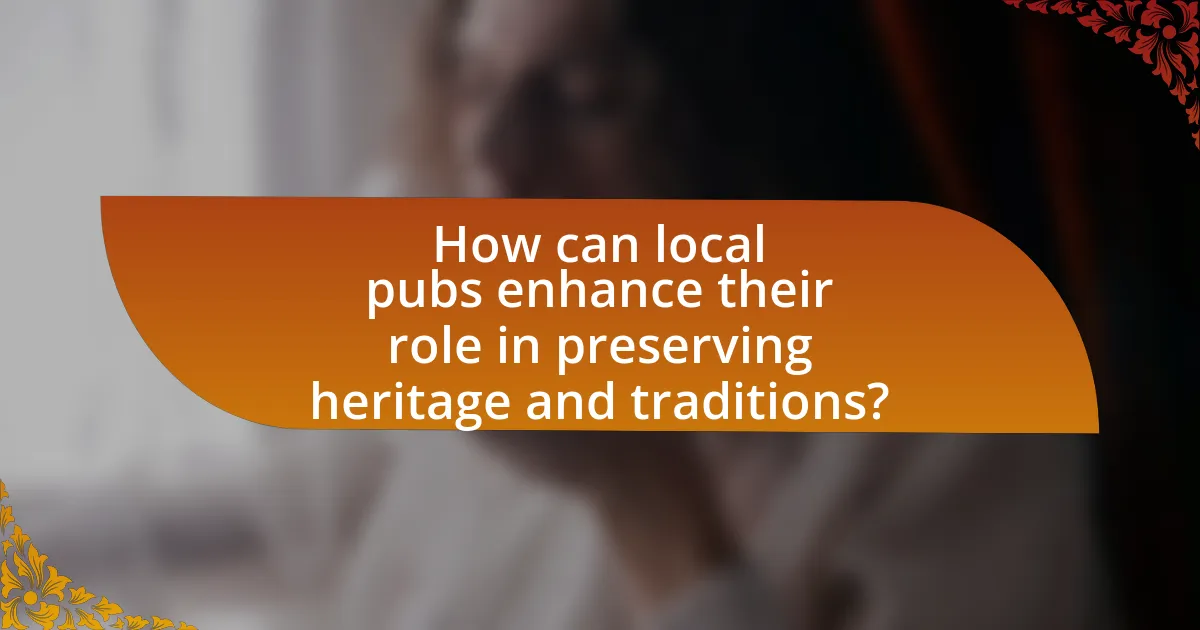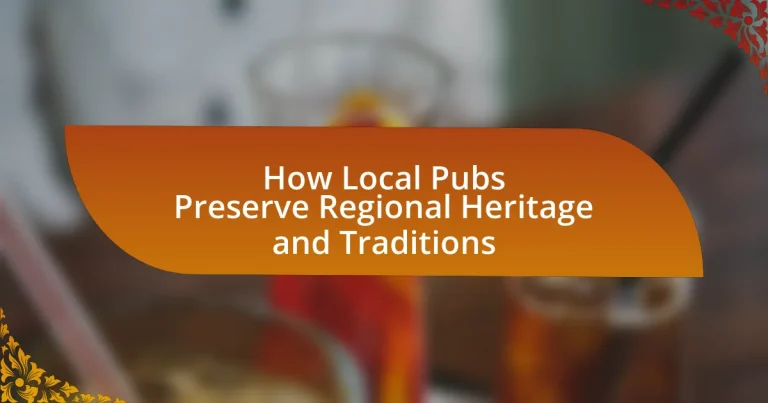Local pubs play a crucial role in preserving regional heritage and traditions by serving as community hubs that foster cultural practices and social interactions. They host events such as traditional music nights, local food festivals, and storytelling sessions, which celebrate regional customs and promote local artisans. Pubs reflect local history through their architecture, decor, and menus that feature regional dishes and beverages, thereby enhancing community identity. Additionally, they support local suppliers, engage younger generations, and collaborate with cultural organizations to further strengthen their cultural significance and community ties.

How do local pubs contribute to preserving regional heritage and traditions?
Local pubs contribute to preserving regional heritage and traditions by serving as community hubs that foster cultural practices and social interactions. These establishments often host events such as traditional music nights, local food festivals, and storytelling sessions that celebrate regional customs. For example, many pubs feature local brews and dishes that reflect the area’s culinary history, thereby promoting local artisans and farmers. Additionally, pubs often display historical memorabilia and artwork that narrate the local history, creating an environment where patrons can engage with their heritage. This active participation in cultural preservation is vital, as it helps maintain a sense of identity and continuity within the community.
What role do local pubs play in community identity?
Local pubs serve as vital social hubs that foster community identity by providing a space for residents to gather, share experiences, and engage in local culture. These establishments often reflect the history and traditions of the area, showcasing regional beverages, cuisine, and decor that resonate with the community’s heritage. For instance, many pubs host events such as quiz nights, live music, and local art displays, which strengthen social ties and promote local talent. Research indicates that communities with active local pubs report higher levels of social cohesion and community engagement, underscoring their role in preserving and enhancing regional identity.
How do local pubs reflect the history of their regions?
Local pubs reflect the history of their regions by serving as social hubs that embody local culture, traditions, and historical narratives. These establishments often showcase regional architecture, local brews, and traditional cuisine, which are tied to the area’s agricultural practices and historical events. For instance, many pubs display memorabilia or host events that commemorate significant local milestones, such as battles or festivals, thereby preserving collective memory. Additionally, the evolution of pub names often reflects historical figures, events, or local folklore, providing insight into the region’s past. This connection to history is further emphasized by the role of pubs in community gatherings, where stories and traditions are passed down through generations, reinforcing their status as vital cultural landmarks.
What cultural practices are commonly associated with local pubs?
Cultural practices commonly associated with local pubs include communal gatherings, live music events, and traditional food offerings. These practices foster social interaction and community bonding, as pubs often serve as informal meeting places for locals. For instance, many pubs host quiz nights, open mic sessions, and folk music performances, which not only entertain but also celebrate local talent and culture. Additionally, the serving of regional dishes and locally brewed beers reinforces the connection to local heritage, as seen in pubs that feature menus highlighting traditional recipes and local ingredients. This blend of social activities and culinary traditions helps preserve and promote regional identity within the community.
Why are local pubs considered social hubs in their communities?
Local pubs are considered social hubs in their communities because they provide a welcoming space for social interaction and community engagement. These establishments often host events, such as quiz nights and live music, which foster connections among residents. Additionally, local pubs serve as venues for celebrating regional traditions and cultural heritage, reinforcing community identity. Research indicates that pubs contribute to social cohesion by offering a familiar environment where people can gather, share experiences, and build relationships, thus playing a vital role in the social fabric of their neighborhoods.
How do local pubs foster social connections among residents?
Local pubs foster social connections among residents by serving as communal gathering spaces that encourage interaction and relationship-building. These establishments often host events such as trivia nights, live music, and community celebrations, which draw people together and create opportunities for socializing. Research indicates that regular attendance at local pubs can enhance community cohesion, as they provide a familiar environment where residents can meet, share experiences, and form friendships. Additionally, the informal atmosphere of pubs allows for spontaneous conversations and connections, further strengthening social ties within the community.
What events and activities do local pubs host to engage the community?
Local pubs host a variety of events and activities to engage the community, including quiz nights, live music performances, and themed food festivals. These events foster social interaction and create a sense of belonging among patrons. For example, quiz nights often attract teams from the local area, encouraging friendly competition and collaboration. Live music performances frequently feature local artists, promoting regional talent and enhancing the cultural landscape. Additionally, themed food festivals celebrate local cuisine and traditions, drawing in community members and supporting local suppliers. Such activities not only entertain but also strengthen community ties and preserve regional heritage.
In what ways do local pubs support local artisans and producers?
Local pubs support local artisans and producers by sourcing their food and beverages from nearby farms and breweries. This practice not only boosts the local economy but also fosters community relationships, as pubs often feature menus that highlight local ingredients and craft beers. For instance, a study by the Campaign for Real Ale (CAMRA) found that pubs that prioritize local sourcing can increase sales for local producers by up to 30%. Additionally, many pubs host events such as farmers’ markets or artisan fairs, providing a platform for local artisans to showcase their products directly to consumers. This collaboration enhances the visibility of local craftsmanship and strengthens the cultural identity of the region.
How do local pubs incorporate regional food and drink into their offerings?
Local pubs incorporate regional food and drink into their offerings by sourcing ingredients from local farms and breweries, thereby reflecting the culinary traditions of their area. This practice not only supports local economies but also enhances the authenticity of the pub experience. For example, many pubs feature seasonal menus that highlight local specialties, such as dishes made with locally sourced meats, cheeses, and vegetables. Additionally, they often serve craft beers and spirits produced by nearby breweries and distilleries, which fosters a sense of community and pride in local craftsmanship. This approach is validated by studies showing that local sourcing can increase customer loyalty and satisfaction, as patrons appreciate the connection to their regional heritage.
What impact does supporting local suppliers have on the community?
Supporting local suppliers positively impacts the community by fostering economic growth and enhancing social cohesion. When local pubs source products from nearby suppliers, they stimulate the local economy, keeping money within the community and creating jobs. According to a study by the American Independent Business Alliance, local businesses recirculate a greater share of every dollar as they create locally owned supply chains, which can lead to a multiplier effect that benefits the entire community. Additionally, supporting local suppliers helps preserve regional heritage and traditions by promoting local products and cultural practices, thereby strengthening community identity and pride.

What specific traditions are maintained by local pubs?
Local pubs maintain several specific traditions that reflect regional heritage and community values. These traditions include hosting quiz nights, celebrating local festivals, and serving traditional dishes and locally brewed beers. For example, quiz nights foster community engagement and social interaction, while local festivals often feature themed events that celebrate regional culture, such as St. Patrick’s Day or harvest festivals. Additionally, the emphasis on serving traditional dishes, like fish and chips in the UK, and locally sourced beverages supports local economies and preserves culinary heritage. These practices not only enhance the pub experience but also reinforce the cultural identity of the community.
How do local pubs celebrate regional festivals and events?
Local pubs celebrate regional festivals and events by hosting themed nights, offering special menus, and organizing community activities. These establishments often create a festive atmosphere with decorations that reflect the specific event, such as St. Patrick’s Day or local harvest festivals. For example, during Oktoberfest, many pubs serve traditional German beers and foods, enhancing the cultural experience. Additionally, local pubs may feature live music or entertainment that aligns with the festival, fostering community engagement and preserving local traditions. This approach not only attracts patrons but also reinforces the cultural significance of the events within the community.
What types of traditional music and entertainment are featured in local pubs?
Local pubs feature traditional music and entertainment such as folk music, live bands, and storytelling sessions. Folk music often includes acoustic performances with instruments like fiddles, guitars, and accordions, reflecting regional styles and cultural narratives. Live bands may perform a variety of genres, often incorporating local musical traditions, while storytelling sessions engage patrons with tales that highlight community history and folklore. These forms of entertainment not only provide enjoyment but also serve to preserve and promote regional heritage and traditions, fostering a sense of community identity.
How do local pubs commemorate historical events or figures?
Local pubs commemorate historical events or figures through various methods such as themed decor, special events, and the naming of drinks or dishes. For instance, many pubs display memorabilia related to local history, including photographs, artifacts, and plaques that honor significant events or notable individuals from the area. Additionally, pubs often host events like anniversary celebrations or historical reenactments that engage the community and educate patrons about their heritage. Furthermore, some establishments create signature cocktails or menu items named after historical figures, thereby integrating local history into the dining experience. This practice not only preserves regional heritage but also fosters a sense of community identity and pride.
What unique customs are associated with local pubs in different regions?
Local pubs exhibit unique customs that reflect the cultural heritage of their regions. In Ireland, for instance, the tradition of “session” music sessions encourages local musicians to gather and play traditional tunes, fostering community spirit. In England, the practice of “pub quizzes” engages patrons in trivia competitions, often supporting local charities. In Scotland, the custom of “whisky tastings” highlights the region’s distilling heritage, allowing patrons to explore various local whiskies. These customs not only enhance the social experience but also serve to preserve and promote regional traditions and identities.
How do drinking rituals vary across different local pubs?
Drinking rituals vary significantly across different local pubs, reflecting regional customs and cultural heritage. For instance, in Irish pubs, patrons often engage in communal singing and storytelling, fostering a sense of community, while in British pubs, the tradition of “pub quizzes” encourages social interaction and competition among locals. Additionally, some American dive bars may emphasize casual drinking with a focus on sports viewing, creating a lively atmosphere centered around game nights. These variations not only enhance the drinking experience but also serve to preserve local traditions, as evidenced by the unique practices and events that are often tied to the history and identity of the community surrounding each pub.
What are some examples of regional pub games and competitions?
Examples of regional pub games and competitions include darts, skittles, and pub quizzes. Darts is widely played in pubs across the UK, with organized leagues and tournaments, showcasing skill and precision. Skittles, a traditional game in various regions, involves knocking down wooden pins and is often played in pub competitions, particularly in the West Midlands. Pub quizzes, popular in many areas, foster community engagement and knowledge sharing, with teams competing for prizes. These games not only provide entertainment but also serve to preserve local customs and foster social interaction within communities.

How can local pubs enhance their role in preserving heritage and traditions?
Local pubs can enhance their role in preserving heritage and traditions by actively hosting community events that celebrate local culture, such as traditional music nights, craft fairs, and storytelling sessions. These events foster a sense of community and provide a platform for local artists and artisans to showcase their work, thereby keeping regional customs alive. For instance, pubs that feature local brews or traditional dishes contribute to the preservation of culinary heritage, as seen in the rise of gastropubs that emphasize local sourcing. Additionally, by displaying historical memorabilia and engaging in partnerships with local heritage organizations, pubs can educate patrons about the area’s history, further solidifying their role as cultural hubs.
What strategies can local pubs implement to engage younger generations?
Local pubs can engage younger generations by incorporating modern technology and social media into their marketing strategies. By utilizing platforms like Instagram and TikTok, pubs can showcase their events, promotions, and unique offerings, appealing to the visual preferences of younger audiences. Additionally, hosting interactive events such as trivia nights, live music, and themed parties can create a vibrant atmosphere that attracts younger patrons. Research indicates that 70% of millennials prefer experiences over material goods, highlighting the importance of creating memorable social experiences in pubs. Furthermore, offering a diverse range of craft beers and cocktails that cater to evolving tastes can enhance the appeal to younger customers, as 54% of younger drinkers express interest in trying new and innovative beverages.
How can local pubs collaborate with cultural organizations?
Local pubs can collaborate with cultural organizations by hosting events that celebrate regional heritage, such as traditional music nights or art exhibitions. This partnership allows pubs to serve as venues for cultural activities, enhancing community engagement and preserving local traditions. For instance, a study by the University of Leeds found that pubs that engage with local artists and cultural groups see a 30% increase in patronage during events, demonstrating the mutual benefits of such collaborations.
What role does marketing play in promoting regional heritage through local pubs?
Marketing plays a crucial role in promoting regional heritage through local pubs by highlighting unique cultural aspects and traditions associated with the area. Local pubs often serve as community hubs where regional history, cuisine, and craft beverages are showcased, and effective marketing strategies can amplify these elements. For instance, targeted advertising campaigns can emphasize locally sourced ingredients, traditional brewing methods, and historical narratives tied to the pub’s location, thereby attracting both locals and tourists. Research indicates that 70% of consumers are more likely to visit a pub that actively promotes its local heritage, demonstrating the effectiveness of marketing in enhancing community engagement and economic sustainability.
What best practices can local pubs adopt to sustain their cultural significance?
Local pubs can sustain their cultural significance by actively engaging with the community through events that celebrate local traditions and heritage. Hosting regular cultural events, such as folk music nights, local art exhibitions, or traditional food festivals, fosters a sense of belonging and preserves regional customs. For instance, pubs that feature local brews and dishes not only support local producers but also educate patrons about the area’s culinary history. Additionally, collaborating with local artists and musicians can enhance the pub’s role as a cultural hub, attracting diverse audiences and encouraging community participation. Research indicates that community-oriented establishments contribute significantly to local identity and cohesion, reinforcing the pub’s importance as a cultural landmark.
How can local pubs create a welcoming environment for diverse communities?
Local pubs can create a welcoming environment for diverse communities by implementing inclusive practices and fostering a sense of belonging. This can be achieved through staff training on cultural sensitivity, offering a diverse menu that reflects various culinary traditions, and hosting events that celebrate different cultures, such as themed nights or festivals. Research indicates that inclusive environments enhance community engagement and patron loyalty, as seen in studies showing that businesses embracing diversity experience increased customer satisfaction and retention rates. By actively promoting inclusivity, local pubs not only attract a broader clientele but also contribute to the preservation of regional heritage and traditions through shared cultural experiences.
What are effective ways for local pubs to document and share their history?
Local pubs can effectively document and share their history by creating a dedicated historical archive that includes photographs, memorabilia, and written accounts from patrons and staff. This archive can be complemented by hosting community events such as history nights or storytelling sessions, where locals share their experiences and anecdotes related to the pub. Additionally, utilizing social media platforms to post historical content and engaging with the community can enhance visibility and interest in the pub’s heritage. Research indicates that community engagement fosters a sense of belonging and pride, which can be beneficial for local businesses.
What are some practical tips for supporting local pubs in preserving heritage?
To support local pubs in preserving heritage, individuals can engage in regular patronage, participate in community events, and advocate for local policies that protect historical sites. Regular patronage provides essential revenue, which helps maintain the pub’s historical features and ambiance. Participating in community events, such as pub quizzes or heritage festivals, fosters a sense of community and raises awareness about the pub’s historical significance. Advocating for local policies can include supporting initiatives that recognize and protect heritage sites, ensuring that local pubs remain integral parts of the community’s cultural landscape. These actions collectively contribute to the sustainability and preservation of local pub heritage.


